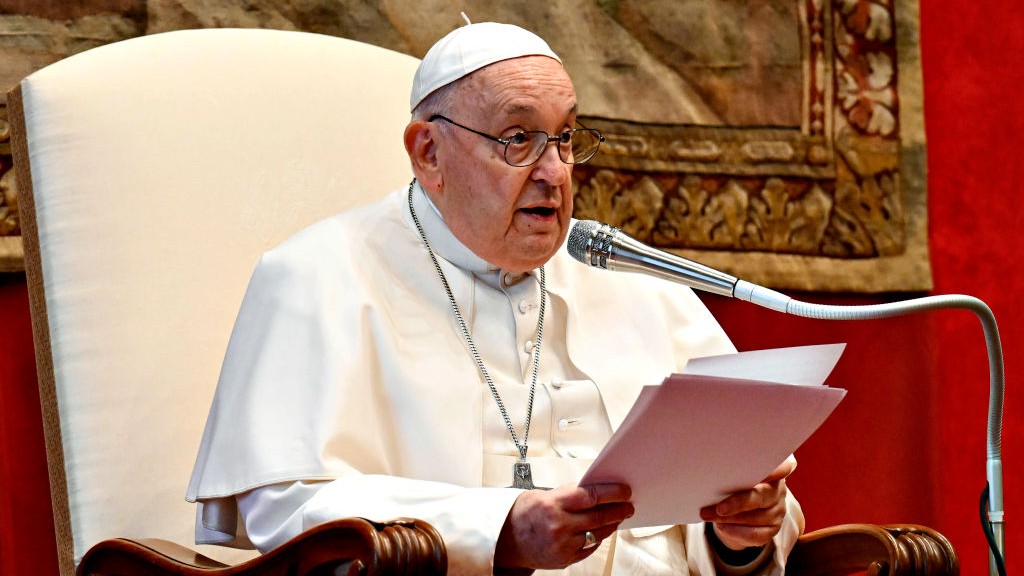The potential consequences of Pope Francis' call for a ban on surrogacy
Francis called the practice 'despicable' and a 'commercialization' of pregnancy


A free daily email with the biggest news stories of the day – and the best features from TheWeek.com
You are now subscribed
Your newsletter sign-up was successful
Pope Francis may have made waves with his announcement that priests would be allowed to bless same-sex couples, an extraordinarily liberal view for the leader of the Catholic Church, but his latest comments on surrogacy are drawing some criticism for being unnecessarily restrictive.
During an address on Monday, Francis said surrogacy turns children into "an object of [human] trafficking." Calling for a worldwide ban on the practice, Francis added that surrogacy was "deplorable" and "represents a grave violation of the dignity of the woman and the child, based on the exploitation of situations of the mother’s material needs."
Gestational surrogacy, described by the Cleveland Clinic as "when another person carries and delivers a child for another couple or person" through in-vitro fertilization, has been denounced by Francis before. His recent comments are by far his strongest words against surrogacy, though, and are generating controversy among people who are both for and against the practice.
The Week
Escape your echo chamber. Get the facts behind the news, plus analysis from multiple perspectives.

Sign up for The Week's Free Newsletters
From our morning news briefing to a weekly Good News Newsletter, get the best of The Week delivered directly to your inbox.
From our morning news briefing to a weekly Good News Newsletter, get the best of The Week delivered directly to your inbox.
Francis 'couldn't be further from the truth'
Francis' characterization of surrogacy "couldn't be further from the truth," Sunshine Hanson, founder of surrogacy agency Surrogacy Is, told NPR. Hanson told the outlet that describing surrogacy as exploitative is "disrespectful to the women who are doing this."
"I just think that it's so brave for a parent to trust somebody else to carry their baby," Hanson said. "It's a really special and unique relationship that I don't think anybody who hasn't been through it can really fathom."
Francis also called surrogacy the basis of a "commercial contract," which is in line with a common criticism of the practice — it exploits people financially. But Hanson pushed back against Francis' comments, saying surrogacy was "intended to compensate you for the time and the effort and the sacrifice and the struggle of being pregnant."
The Catholic Church has traditionally turned against surrogacy due to religious law, but Francis appears to be taking the stance that it violates human rights. But in doing so, "the pope is failing to recognize how varied and nuanced the experiences of intended parents, surrogates and children are," Danielle Tumminio Hansen, a theology professor at Emory University, wrote for The Conversation. Some women indeed "become surrogates out of desperation and are abused in the process, as the pope says," Hanson added, but others "make the choice for altruistic reasons and never accept remuneration."
A free daily email with the biggest news stories of the day – and the best features from TheWeek.com
And while the Church condemns surrogacy because conception — which occurs via in-vitro fertilization — takes place outside of intercourse, it is actually "the only form of assisted reproduction documented in the Bible," according to Hanson.
'Ethically thorny'
While many view Francis as an overall liberal Catholic leader, his "statements on surrogacy are an extension of the church's broader teachings on gender and human life," Jill Filipovic opined for CNN, which is "make as many babies as possible but also leave it in God's hands."
"It's a too-simplistic recipe for a complex human desire, vested in our notoriously imperfect and complicated human bodies," Filipovic added. "Who is anyone else to tell a woman what she can and cannot do with her own body?"
However, surrogacy is "among the most ethically thorny reproductive questions" and "the potential for abuse is high and the negotiating table perilously uneven," Filipovic wrote. This is especially true among wealthy people who are willing to pay poorer women to carry their children, Filipovic said. She also noted that the pope is not alone in condemning surrogacy, as it is banned or restricted in large swaths of Europe and several U.S. states.
"The line between agency and exploitation is not always clear," Filipovic said. But while surrogacy "has too often been a one-way flow of children from poorer countries to richer ones," the problem is the Church's "overly broad, dogmatic and extreme response to surrogacy."
If surrogacy were to be banned globally, it would create "an outcry from people all across the globe who desire to be parents," Stephanie Levich, founder of Family Match Consulting, told People. This could lead to dangerous outcomes as people would pursue surrogacy "[in ways] that could potentially be illegal and less safe," she added. This could lead to large portions of the female demographic being impacted, Levich said.
The "vast majority of surrogacy cases" result in "incredible and beautiful relationships," Levich told People. "I don’t know how something like that could be considered to be exploitative."
Justin Klawans has worked as a staff writer at The Week since 2022. He began his career covering local news before joining Newsweek as a breaking news reporter, where he wrote about politics, national and global affairs, business, crime, sports, film, television and other news. Justin has also freelanced for outlets including Collider and United Press International.
